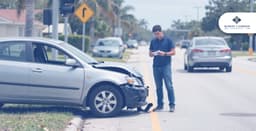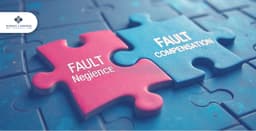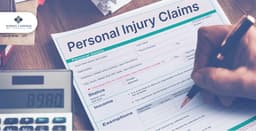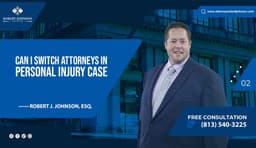
August 31, 2025
The Financial and Legal Benefits of Hiring a Personal Injury Attorney
Accidents can knock the wind out of you physically, emotionally, and financially. In the aftermath of a serious accident, there are the hospital bills, insurance companies, the lost income, and questions you never planned to answer. How will you pay for ongoing treatment? What if the insurance adjuster undervalues your injuries? Who will advocate for what you’re owed?
“There were over 394,000 traffic crashes in Florida in 2023.”
Source: Florida Department of Highway Safety and Motor Vehicles, 2023 Annual Report
These are a daily reality on Florida roads, with so many incidents every year. And when the system fails you, the best legal choice is to hire a personal injury attorney. It’s a step toward clarity, support, and recovering what matters most. So let’s break down the financial and legal benefits of hiring a personal injury attorney and what that decision can mean for your recovery, your rights, and your ability to move forward with greater stability.
1. Why Your Recovery Deserves More Than a Quick Settlement
After an accident, early offers from insurance companies can feel like the only option. Bills begin to arrive, work may be on hold, and the future feels uncertain. These offers often focus only on immediate costs, leaving out many of the lasting effects an injury can cause.
Ongoing medical care, physical therapy, reduced ability to work, and emotional strain from pain or lifestyle changes are rarely addressed in those first figures. Insurance companies often expect people to settle before they fully understand what recovery will require.
A personal injury attorney takes the time to understand the full scope of what has been lost. This includes future health needs, long-term financial impact, and the personal toll of the injury. With access to medical experts, case history, and legal tools, an attorney can calculate what fair compensation should look like in Florida’s legal setting.
"According to the Insurance Research Council, personal injury victims who hired an attorney received settlements that were 3.5 times higher on average than those who settled without one."
Source: Insurance Research Council, Auto Injury Insurance Claims Study
This kind of support helps ensure that a settlement reflects what someone truly needs to move forward.
2. What Florida’s Insurance Covers and Where It Stops Short

Florida follows a no-fault insurance system, which means that after an accident, each driver’s own insurance is responsible for covering their medical bills and lost wages, regardless of who caused the crash. This coverage comes from Personal Injury Protection, or PIP.
Many injured drivers have a hard time because there's a limit to how much coverage they can get. PIP coverage in Florida is limited to $10,000, and even that amount is often reduced by coverage rules, deductibles, and billing limits. It may fall short in situations involving ambulance transport, surgery, or more than a few days in the hospital.
"Florida requires drivers to carry $10,000 in Personal Injury Protection (PIP), which may not cover emergency surgery or extended hospital stays."
Source: Florida Statutes § 627.736
Once medical expenses or the severity of the injury go beyond that coverage, it may be possible to file a personal injury claim against the other driver. That process depends on whether the injury meets Florida’s legal definition of a “serious injury,” which includes permanent injury, significant disfigurement, or major limitations on daily activities.
A personal injury attorney reviews medical records, consults with doctors, and examines the facts of the case to determine if that threshold is met. When it is, it opens the door to pursuing compensation that can reflect the true impact of the injury.
3. Insurance Companies Have Lawyers — So Should You
After an accident, insurance adjusters may sound helpful. However, their job is to protect the company’s bottom line. Many injured people find themselves dealing with delays, low offers, or having their claims minimized or denied entirely. These tactics are routine, and they are often used at a time when people are in pain and unsure of how to respond.
Florida law adds another layer to this. Under the state’s modified comparative negligence rule, if a person is found to be more than 50% responsible for the accident, they cannot recover any damages. This makes how the story is told and how the facts are presented extremely important.
"Florida follows a modified comparative negligence rule (2023 revision). If you are found more than 50% at fault, you are not allowed to recover damages."
Source: Florida Statutes § 768.81
Insurance companies know how to frame conversations, especially during recorded statements or when asking for access to medical records.These moments matter, and an attorney helps make sure nothing you say or share gets turned against you.
From the first call to the final settlement or verdict, legal guidance helps keep the process from tilting too far in the insurer’s favor.
4. Deadlines Can’t Wait While You Focus on Healing

In Florida, the time to file a personal injury claim is shorter than it used to be. As of March 2023, the window is now two years from the date of the accident. That may sound like enough time, on the other hand, when someone is recovering from serious injuries, the days pass quickly.
"Florida personal injury claims must now be filed within 2 years of the accident."
Source: HB 837, effective March 24, 2023
Waiting too long can mean losing the right to file altogether. Medical records, witness statements, and evidence can also become harder to collect with time. Attorneys keep track of every deadline and make sure the paperwork is filed correctly, so the focus stays on healing without missing the chance for fair compensation.
5. Getting Legal Help Without Paying Upfront
One of the biggest concerns people have is cost. Personal injury attorneys in Florida usually work on a contingency fee basis, which means payment only happens if there is a recovery. This approach makes legal help possible without upfront costs or hourly rates.
The typical contingency fee is about one-third of the settlement if the case resolves before a lawsuit is filed. If the case goes to court, the fee may increase slightly, depending on the stage and complexity.
"Most Florida personal injury attorneys charge 33⅓% 40% contingency fees."
Source: Florida Bar Rules of Professional Conduct, Rule 4-1.5(f)
This structure helps make sure both the client and attorney are working toward the same result, getting the best outcome possible.
6. Settlement or Trial? Your Lawyer Prepares for Both
Most personal injury cases are resolved through settlement. Even so, a strong legal strategy includes preparing as if the case will go to court. That preparation puts pressure on the insurance company to offer more fair terms.
Attorneys gather medical records, consult with specialists, and bring in experts like accident reconstruction professionals when needed. If the case must be presented before a judge or jury, nothing is left to chance.
"Approximately 95% of personal injury cases in the U.S. settle before trial."
Source: Bureau of Justice Statistics, Civil Bench and Jury Trial Statistics
Whether the case settles quickly or requires litigation, preparation makes a difference.
7. Healing Is Hard Enough Without Legal Stress

After an accident, managing recovery is already a full-time job. Legal tasks can quickly pile up and become overwhelming. Having an attorney means those responsibilities are handled with care, so you’re not left to do everything alone.
Here’s what legal support covers:
Takes over communication: Attorneys speak directly with insurance companies, adjusters, and other parties on your behalf so you don’t have to explain yourself repeatedly or risk saying something that could affect your case.
Handles all paperwork: From filing claims to submitting court documents, every form is completed accurately and on time.
Collects and organizes evidence: Your attorney gathers police reports, medical records, photographs, and witness statements to build a strong case.
Protects your privacy: They control what medical information is shared and make sure only what’s relevant is provided.
Tracks every deadline: Legal timelines are strict. Attorneys keep your case moving without missing important filing dates.
Updates you clearly and consistently: You’ll know where your case stands without chasing down information.
This kind of support allows you to focus on rest, treatment, and adjusting to what’s ahead. It takes one major source of pressure off your shoulders.
8. Florida Roads by the Numbers: Why Representation Matters Here
Florida’s roads are among the busiest in the country. The mix of urban traffic, frequent visitors, and a high number of uninsured drivers creates a serious risk of accidents. When crashes happen, the outcome depends on how quickly and thoroughly the case is handled.
In a state with this level of risk, working with someone who understands Florida’s legal system and insurance rules can make a real difference. Representation is not just helpful. It is often the deciding factor in whether someone recovers what they are owed.
Start Your Recovery Journey with Robert J. Johnson for Trusted Florida Personal Injury Support and Fair Compensation
After an injury, handling the legal side can be difficult and confusing.We help people across Florida get fair compensation and guide them through every step. With experience in Florida’s laws and insurance practices, we make sure your claim reflects the full impact of your injury. Contact Robert J. Johnson today to start your case or ask questions about the process.





































































